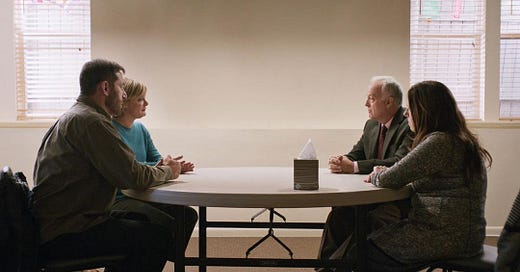Heartland: Mass
Franz Kranz's directorial debut delicately tackles weighty material anchored by a quartet of powerhouse performances
Click here for Heartland Film Festival showtimes and tickets!
You might not know his name, but Franz Kranz has been working in the industry for quite some time as a character actor popping up in films such as ‘The Cabin In The Woods’ and ‘The Village’. With ‘Mass’ he has made his directorial debut, which may very well steer his career in another direction. Tackling the heavy themes of gun violence, forgiveness and the stigma around mental health all in the confines of one location, there is plenty of potential but there is also quite a bit that could have gone wrong.
‘Mass’ is set in the downstairs section a small Episcopal church, with most of the action taking place in a community room. Right off the bat, everything feels grounded, even the chirpy church worker Judy (Breeda Wool) and teen slacker Anthony (Kagen Albright) feel like people one might expect when walking into a church. We learn that the staunch social worker Kendra (Michelle N. Carter) has placed together two pairs of parents: Richard and Linda (Reed Birney and Ann Dowd) as well as Jay and Gail (Jason Isaacs and Martha Plimpton) who are connected by a devastating and violent tragedy involving their sons. The trio ends up getting out of the picture and the film then switches to the parents.
Kranz lets the situation between the four leads play out organically, letting their mourning and their story slowly unravel until the audience pieces together what is going on. Richard and Linda initially attempt to bring a sense of sweetness and humanity but are clearly in denial of the situation while Jay and Gail are visibly uncomfortable. Slowly but surely as everything becomes more clear and the film’s themes start to make their mark.
‘Mass’ is a powerhouse of a experience, playing out as if you’re a fly on the wall, listening into the conversation. Kranz’s direction is quiet and instead of demanding the spotlight lets the quartet of lead performers take the charge. There are a couple of noticeable motifs present throughout the film, from a red ribbon tied to a ratty wired fence as well as a changing aspect ratio at the film’s halfway point, but it never overtakes the story being told.
There is not a weak link between Birney, Dowd, Isaacs, and Plimpton, with all four performances feeling raw. It helps that while we have seen these actors before onscreen, notably Isaacs and Dowd, the fact their not overly familiar faces just makes the film feel all the more real. Dowd is absolutely outstanding, turning in a performance that needs to be seen to be believed. Dowd brings dimensions and humanity to Martha making sure she never feels artificial but instead like a real person. Isaacs also gives stellar work as Jay, after performing as a character actor in roles such as Lucius Malfoy in the Harry Potter franchise, his work here is far and away his best work yet. Isaacs makes Jay feel like someone we may know in real life, from the feeling of discomfort when his political beliefs are brought into question to attempting to shield his devastation from becoming visible, Isaacs’ performance is transformational from the acting and writing alone. Birney and Plimpton are superb and need to be given credit as well, Birney succeeds in portraying Richard’s devastation while Plimpton commands the screen when illustrating Gail’s frustration and anguish.
Kranz’s screenplay is one of the very best of the year, while it certainly acts almost like a play in terms of it’s structure, the right choice was clearly made with making this as a film. The dialogue tackles deeper subject matter such as the epidemic of mass shootings and their impact, in a way that never feels as if it’s making a statement, but rather holding up a magnifying glass to the topic. The screenplay is compelling from start to finish and it’s hard not to be engaged with the film’s dialogue. The only element that didn’t feel necessary was the inclusion of Wool and Albright’s characters, who while they are clearly there to serve as a sense of relief, feel like their in a different movie when examining the bigger picture.
‘Mass’ is one of the most emotionally draining cinematic experiences one will have this year. This will no doubt be a player in this year’s awards season, especially in the acting and screenplay categories. While it may leave the audience feeling knocked out by the time the credits roll, it’ll prove to be a rewarding experience in the long haul.





